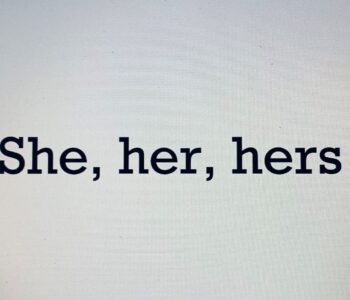
Are you good at tooting your own horn? I’m…
I’ve been writing a lot for clients lately, so much so that I haven’t spent as much time on my own content. What I have been working on has made me realize, I’m not very good at tooting my own horn.
How many of us are?
Don’t brag or show off in school
Perhaps this goes back to childhood. We were taught not to brag. Talking about yourself and your abilities could be seen as “showing off,” which has negative connotations.
In school, you didn’t want to be known as “teacher’s pet.” Kids would find any reason to pick on one another, even for things like being smart or talented. I went through 13 years of school as a “smart girl,” which wasn’t a compliment.
By the time I got to high school, I didn’t care. For years, I’d learned to keep my head down and my mouth shut. And finally, as an upperclassman, I was able to do my own thing with my own friends and not have to worry about or interact much with those who disliked me because I was smart.
Still, though, I didn’t go around tooting my own horn. I wasn’t like, “Look at me! See what I can do!”
Work speaks for itself
College was so different. There’s no comparison. No one cares about you and your grades. If they asked how you did on a test or a paper, it’s because they were a friend and interested for your sake, not theirs. There was an anonymity in college that I appreciated. I could do my own thing and be compared only to myself – not others. And aside from professors, I didn’t have to prove myself. If I did the work and studied, I got the grade. No showing off necessary.
Then, there’s the work world. At least there, my work would speak for itself. I was writing every day, and my bosses – my editors – saw every word before it was published. They knew what I did right and wrong and helped me be a better writer and editor.
The closest we came to bragging was beating TV or radio to a story before the internet was a thing. And then, we only bragged to ourselves in the newsroom. “We published it before anyone else!” I’m not sure if that counts as bragging.
Switching gears to marketing was a little odd. After years of working with news releases and various agencies, businesses and organizations, I knew how to do it. In particular, I knew our community inside and out. I knew how people thought and acted in our insular world, and I was able to reach them.
It was a chance to “show off” our business and what we had to offer. But that still was different than “showing off,” or at least it was in my mind. Perhaps it’s just semantics.
Tooting my own horn is hard
In my remote job search, I needed to show off my work and skills a bit more. I’ve tweaked my resume so many times to try and focus on exactly what an employer wanted. Unfortunately, I don’t have much to show for it.
Instead, I’ve had greater success as a freelance writer and editor. Those jobs I’ve gotten thanks to my journalism experience and just being myself. My work continues to speak for itself, and some clients have generously shared my talents via word of mouth.
Even that sounds like bragging, though.
Which brings me back to my original thought about “tooting my own horn.” I’m in the middle of a project that requires it, yet I struggle to put myself out there. I’d rather stay in the corner and let people find me.
Do others feel the same way? Or is it just me?
Please, share your thoughts in the comments.
How to Be a Better Writer Tip
Style quote marks stand out
I’ve been working with a client who requested I use a curly version of quote marks and apostrophes instead of straight ones in the copy I submit.
To be honest, I hadn’t noticed the difference in the sans-serif font I was using (Calibri). They are much easier to spot in a font with serifs (Times New Roman).
I hadn’t considered quote marks and apostrophes for a while. When I worked at the newspaper, it was something I checked every day. I had a standard find-and-replace for every contributed article, because they often would be the wrong kind. It was funny that it came up now, after so many years.
However, I love that bit of detail. The editor who asked me to do it likely thought he was being really picky and probably figured I’d roll my eyes, but I didn’t. Instead, I was sort of excited about it. Here’s someone I get – someone who wants everything – down to the quote marks – to be perfect.
I found myself looking at and changing all the quote marks and apostrophes in a piece for a different client. Had one editor not asked, I likely wouldn’t have noticed the difference in the copy I was editing.
Writing and editing requires care with so many details, some we rarely think about. Choosing the style of quote marks and apostrophes is one little way to stand out.




1 COMMENT
It’s great to see a blog about writing (and especially a first book). There are some valuable insights here.
Thank you so much.
Amelia